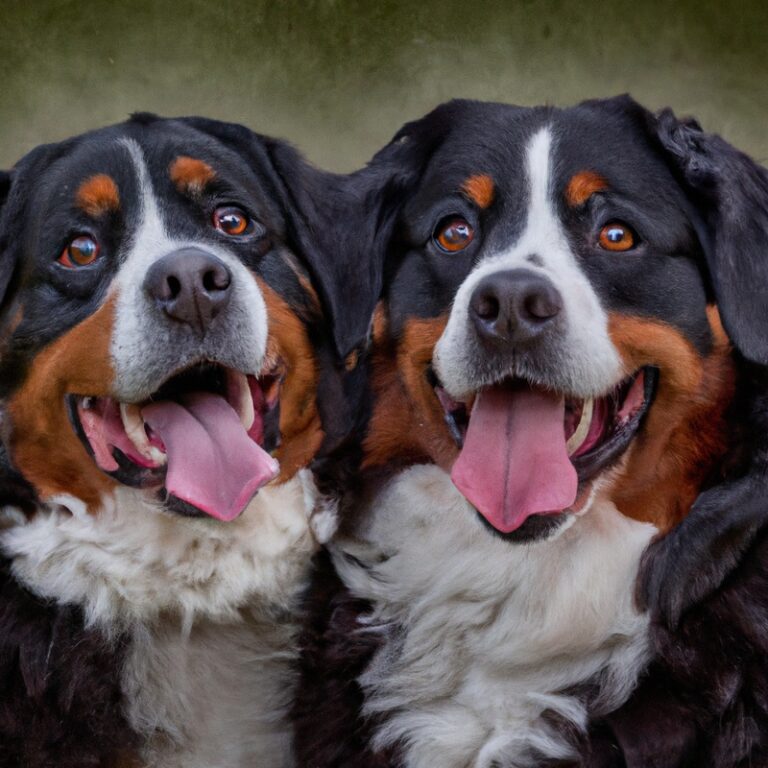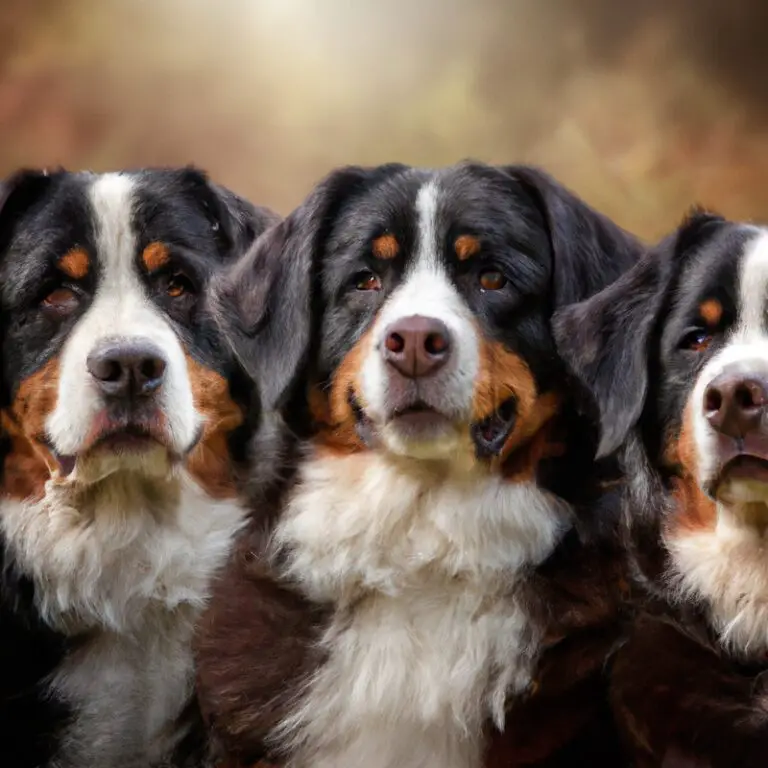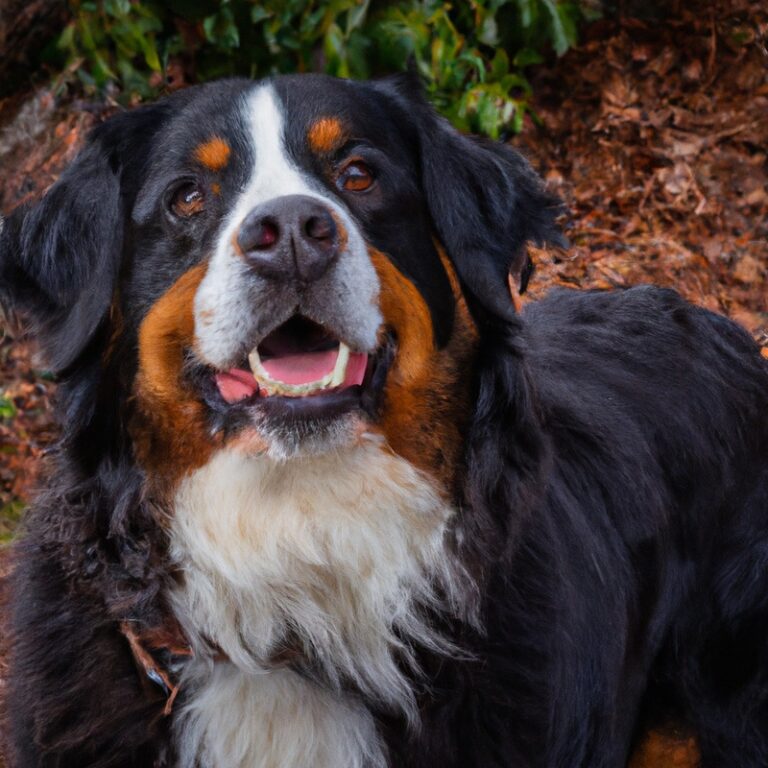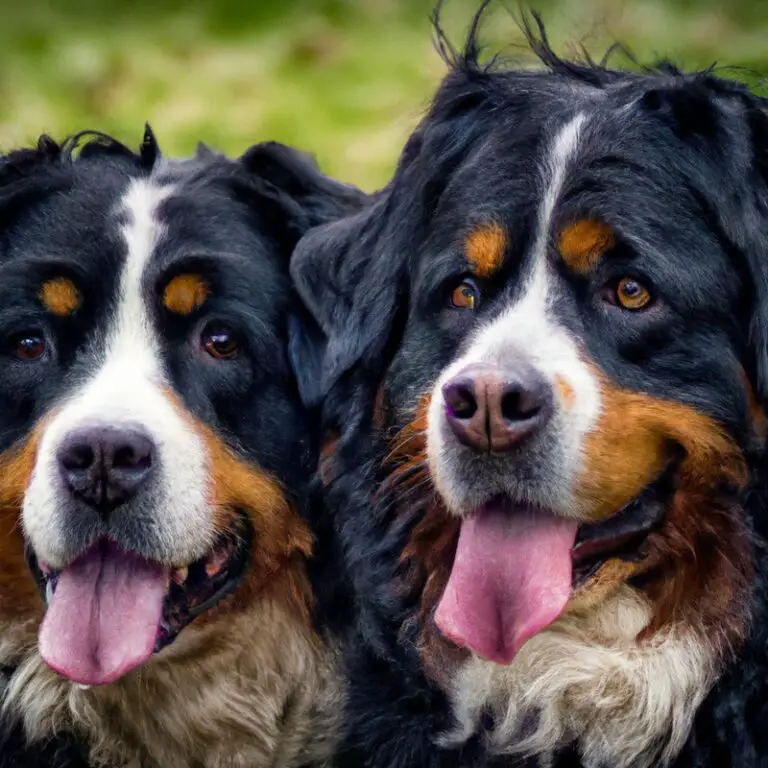What Are The Main Differences Between Male And Female Bernese Mountain Dogs?
Key Takeaways:
- You can distinguish male and female Bernese Mountain Dogs by their size and weight.
- Females tend to be smaller and lighter than males.
- Males typically have a more dominant and protective nature.
- Female Bernese Mountain Dogs may be more nurturing and affectionate.
Are you considering adopting a Bernese Mountain Dog but wondering if there are any major differences between male and female dogs of this breed? Well, you’ve come to the right place! As an expert in the world of Bernese Mountain Dogs, I’m here to shed some light on the topic.
From physical characteristics to temperament, health issues to training styles, we’ll explore all the main differences between male and female Bernese Mountain Dogs.
So, if you’re ready to uncover the unique qualities of these majestic canines, let’s dive in!
| Category | Male Bernese Mountain Dogs | Female Bernese Mountain Dogs |
| Size | Larger and heavier | Smaller and lighter |
| Weight | Average weight between 85-110 lbs | Average weight between 70-95 lbs |
| Height | Average height between 24-28 inches | Average height between 23-27 inches |
| Temperament | Might be more independent and reserved | Might be more affectionate and social |
| Energy Level | Usually more energetic | Usually more calm |
| Grooming | Longer and thicker coat | Shorter and less dense coat |
| Health | More prone to certain health issues | Less prone to certain health issues |
Physical Differences
Size and weight comparison between male and female Bernese Mountain Dogs
Male Bernese Mountain Dogs are typically larger and heavier than females. On average, males range from 25 to 28 inches in height at the shoulder, while females are slightly smaller, measuring between 23 and 26 inches.
In terms of weight, males usually weigh between 85 and 120 pounds, while females tend to be lighter, weighing between 70 and 95 pounds.
However, it’s important to note that individual variations can occur within each gender.
Body structure and build variations
Male and female Bernese Mountain Dogs have some distinct variations in their body structure and build.
Males tend to have a more robust and muscular appearance, with a larger overall size.
Females, on the other hand, are generally slightly smaller in stature and have a more elegant and graceful appearance.
Additionally, males often have broader heads and chests compared to females.
These differences in body structure and build contribute to the unique characteristics and charm of each gender.
Coat Differences
Length, texture, and color variations in the fur of male and female Bernese Mountain Dogs
Male and female Bernese Mountain Dogs have notable differences in the length, texture, and color of their fur. Length: Males typically have a slightly longer coat compared to females.
The fur on their bodies and tails tends to be fuller and more abundant.
Texture: Male Bernese Mountain Dogs often have a rougher, coarser texture to their fur, while females tend to have a softer and silkier feel. Color Variations: Both genders have a distinctive tri-colored coat, with black, white, and rust markings.
However, male Bernese Mountain Dogs may have more pronounced and vibrant coloring, especially in their rust-colored areas.
Overall, while these variations may not impact the personality or behavior of these wonderful dogs, they do add to their unique and gorgeous appearance.

Shedding patterns and grooming requirements
Male and female Bernese Mountain Dogs have similar shedding patterns and grooming requirements.
Both genders have a dense double coat that sheds moderately throughout the year and heavily during seasonal changes.
Regular brushing is essential to manage shedding and prevent mats.
Use a slicker brush and comb to remove loose hair and tangles.
Bathing should be done every few months or as needed.
Additionally, weekly ear cleaning, teeth brushing, and nail trimming are important for their overall grooming upkeep.
Temperament and Behavior
General personality traits of male Bernese Mountain Dogs
Male Bernese Mountain Dogs have a friendly and loving personality.
They are generally calm, gentle, and loyal.
They love being around their family and are known to be good with children.
Male Bernese Mountain Dogs are also known for their protective nature, making them great watchdogs.
They enjoy socializing with other dogs and are usually friendly towards them.
However, they can be independent at times and may require consistent training and socialization to bring out the best in their personality.
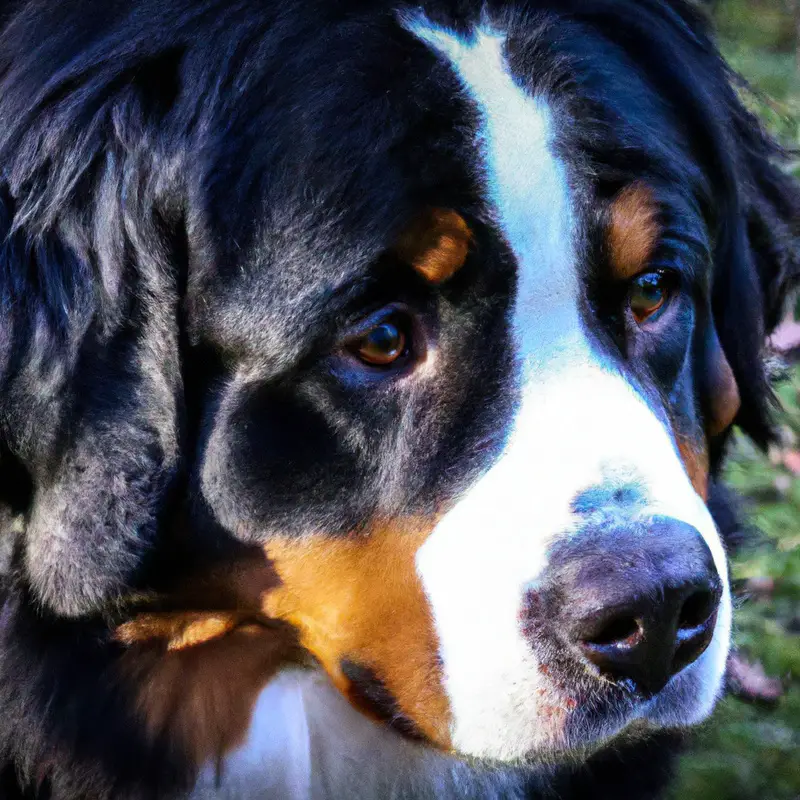
General personality traits of female Bernese Mountain Dogs
Female Bernese Mountain Dogs generally have a calm and gentle personality.
They tend to be more patient and tolerant compared to males.
Females are often known to be more independent and self-reliant.
They are typically attentive, affectionate, and loyal towards their owners.
Female Bernese Mountain Dogs also have a nurturing instinct and can be great mothers.
However, individual personalities can vary, so it’s important to consider the unique traits of each dog when choosing a pet.
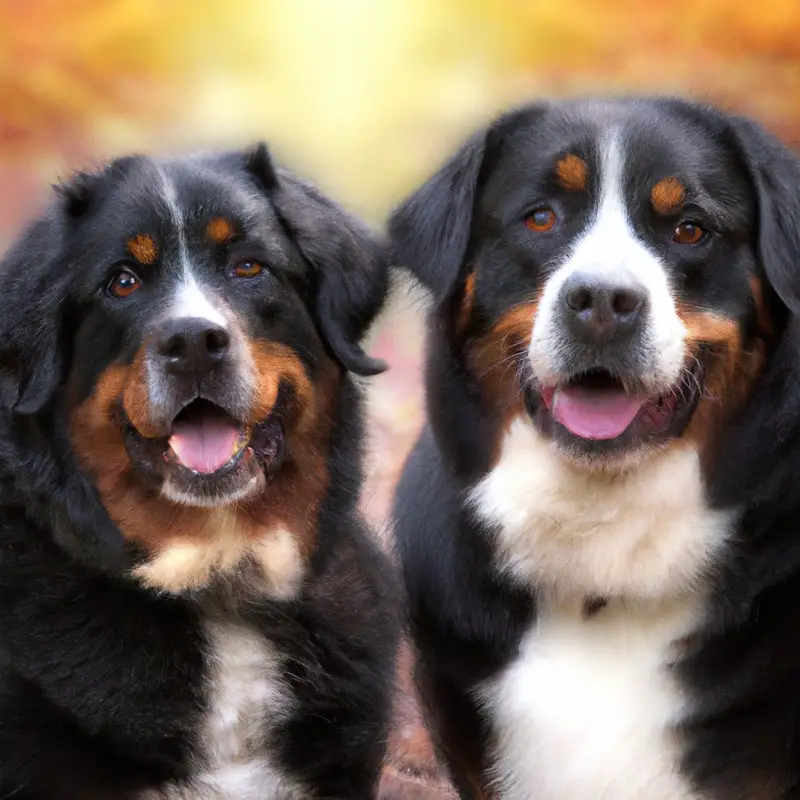
Behavioral differences and tendencies
Male Bernese Mountain Dogs tend to be larger and heavier than females, which can lead to differences in behavior.
Males are often more protective and territorial, while females are generally more nurturing and social.
Male Bernese Mountain Dogs may also display more dominant behavior and be more prone to marking their territory.
It’s important to consider these behavioral differences when choosing a Bernese Mountain Dog that suits your lifestyle and preferences.
Keep in mind that individual personalities can vary, regardless of gender.
Health Differences
Common health issues in male Bernese Mountain Dogs
Male Bernese Mountain Dogs are prone to certain health issues. One common issue is hip dysplasia, a condition where the hip joints do not develop properly.
They can also suffer from elbow dysplasia, which affects the elbow joints.
Additionally, males may experience bloat, a potentially life-threatening condition where the stomach fills with gas. Cancer is another concern, with a higher incidence in males.
It is important to monitor their weight, provide regular exercise, and schedule routine check-ups with a veterinarian to ensure their overall health and well-being.
Common health issues in female Bernese Mountain Dogs
Female Bernese Mountain Dogs, like any other breed, may be susceptible to certain health issues.
Some common health problems seen in female Bernese Mountain Dogs include:
- Canine hip dysplasia: This condition affects the hip joints and can lead to pain and mobility issues.
- Elbow dysplasia: Similar to hip dysplasia, this condition affects the elbow joints and can cause lameness and discomfort.
- Progressive retinal atrophy (PRA: PRA is an inherited eye disorder that can result in vision loss and blindness.
- Cancer: Female Bernese Mountain Dogs have a higher risk of developing different types of cancer, including mast cell tumors and hemangiosarcoma.
- Hypothyroidism: This condition occurs when the thyroid gland does not produce enough thyroid hormone, leading to various health problems.
Regular veterinary check-ups, maintaining a healthy diet, and providing regular exercise can help prevent and manage these health issues in female Bernese Mountain Dogs.
Potential differences in lifespan
Male Bernese Mountain Dogs generally have a shorter lifespan compared to females. On average, males tend to live around 7 to 8 years, while females can live slightly longer, around 8 to 10 years.
However, it’s important to remember that lifespan can vary from dog to dog, and many factors can influence it, such as genetics, diet, exercise, and overall health.
Providing proper care and regular veterinary check-ups can help ensure a happy and healthy life for your Bernese Mountain Dog.
Training and Socialization
Trainability and learning style differences in male Bernese Mountain Dogs
Male Bernese Mountain Dogs tend to have a slightly higher trainability than females.
They are often more eager to please and exhibit a strong desire to learn and work.
However, their learning style may vary.
Some males may be more independent and require a more consistent and firm approach to training, while others may be more sensitive and respond better to positive reinforcement techniques.
It’s important to tailor your training methods to suit your individual male Bernese Mountain Dog’s personality and learning style.
Trainability and learning style differences in female Bernese Mountain Dogs
Female Bernese Mountain Dogs tend to be highly trainable, just like their male counterparts. They are intelligent and eager to please, which makes training them a rewarding experience.
However, there can be some differences in their learning styles.
Females may be more sensitive to correction and respond better to positive reinforcement techniques. They may also display a slightly more independent streak and require consistent leadership and clear communication from their owners.
Patience, consistency, and positive reinforcement are key when training female Bernese Mountain Dogs.
Socialization needs and preferences
Socialization is essential for both male and female Bernese Mountain Dogs.
They enjoy being around people, other dogs, and different environments.
Regular socialization helps them develop good behavior and reduce possible aggression.
Taking them to parks, participating in puppy classes, and organizing playdates with other dogs are great ways to socialize them.
Providing positive experiences, such as introducing them to various sights, sounds, and experiences, will help build their confidence and ensure they grow into well-adjusted and friendly dogs.
Frequently Asked Questions about male and female Bernese Mountain Dogs
Are male Bernese Mountain Dogs more aggressive than females?
Male Bernese Mountain Dogs are not inherently more aggressive than females. While individual personalities can vary, gender is not a reliable predictor of aggression in this breed.
It is important to socialize and train Bernese Mountain Dogs of all genders from a young age to ensure they grow into well-behaved and well-adjusted adults.
Remember to provide them with plenty of exercise, mental stimulation, and positive reinforcement training for a happy and balanced dog.
Are male or female Bernese Mountain Dogs better for families?
Both male and female Bernese Mountain Dogs can make great family pets. The suitability of a dog for a family depends more on their individual personality and traits rather than their gender.
It is important to consider factors such as temperament, energy level, and socialization when choosing a dog.
Take the time to meet and interact with both males and females to see which one best matches your family’s needs and lifestyle. Ultimately, the most important thing is finding a dog that fits well with your family dynamics and brings joy to your home.
Is there a difference in energy levels between male and female Bernese Mountain Dogs?
Male and female Bernese Mountain Dogs may have slight differences in energy levels.
Generally, males tend to be more active and energetic, while females may be slightly calmer and more reserved.
However, it’s important to remember that individual personalities and genetics can also play a role in a dog’s energy levels.
It’s best to assess the energy levels of each specific dog rather than rely solely on gender stereotypes.
Do male or female Bernese Mountain Dogs make better pets for first-time owners?
Male and female Bernese Mountain Dogs can both make great pets for first-time owners. Ultimately, it depends on the individual dog’s personality and behavior rather than their gender.
Some male Bernese Mountain Dogs may be more easygoing and laid-back, while others may be more energetic and assertive.
Similarly, female Bernese Mountain Dogs can exhibit a range of temperaments. It’s important to focus on finding a dog that matches your lifestyle and preferences, regardless of their gender.
Additionally, early socialization and obedience training are important for all Bernese Mountain Dogs, regardless of their gender, to ensure they grow up to be well-behaved and happy pets.
Can male and female Bernese Mountain Dogs be kept together?
Yes, male and female Bernese Mountain Dogs can be kept together.
They generally get along well and can form strong bonds.
However, it’s important to properly introduce them and monitor their interactions, especially during the female’s heat cycle.
Spaying or neutering your dogs can help reduce any potential conflicts or unwanted mating.
Providing separate spaces, toys, and attention can also prevent any territorial issues.
Always consult with a professional if you have any concerns about keeping male and female dogs together.
Final Verdict
Male and female Bernese Mountain Dogs have several distinguishing characteristics. Males tend to be larger and heavier, with a more robust body structure.
Females, on the other hand, are typically smaller and lighter.
Coat differences include variations in length, texture, and color. While both genders shed, males are often heavier shedders.
In terms of temperament, males are generally more outgoing and boisterous, while females are usually more reserved and independent.
When it comes to health, both genders are susceptible to certain issues, but males may be more prone to certain cancers. Training and socialization preferences can vary, with males often being more eager to please and females more focused on their own agenda.
In terms of FAQs, aggression is not solely linked to gender, both males and females can show aggression.
Both genders can make great family pets, but energy levels can vary between individuals. First-time owners can choose either gender, but consistent training and socialization are key.
Lastly, male and female Bernese Mountain Dogs can be kept together with proper training and supervision.
Throughout this article, I have provided expert insights and practical advice based on years of experience with Bernese Mountain Dogs. So, whether you are considering adding a male or female Bernese Mountain Dog to your family, you now have a better understanding of the key differences and can make an informed decision based on your specific preferences and needs.


